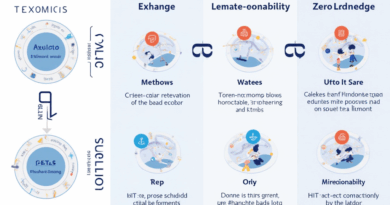Blockchain in Real Estate Transactions: Revolutionizing Property Deals
Blockchain in Real Estate Transactions: Revolutionizing Property Deals
Pain Points in Traditional Real Estate Transactions
The real estate industry has long been plagued by inefficiencies, fraud, and high transaction costs. According to a 2025 Chainalysis report, over $1.2 billion is lost annually due to title fraud and intermediary fees. A recent case in Miami involved a forged deed that transferred ownership of a $2.5 million property, highlighting the vulnerability of paper-based systems. Common pain points include:
- Title fraud: Lack of immutable records enables forgery
- Slow settlements: Average 45-day closing periods
- Excessive fees: 6-10% transaction costs from intermediaries
Blockchain Solutions for Secure Property Transactions
Smart contract escrow systems automate payment releases upon predefined conditions, while decentralized identity verification (DID) eliminates notary fraud. Here’s the implementation process:
- Property tokenization using ERC-721 standards
- Zero-knowledge proof verification for buyer credentials
- Atomic swaps for instant cryptocurrency settlements
| Parameter | Traditional Escrow | Blockchain Escrow |
|---|---|---|
| Security | Single point of failure | Cryptographic multi-sig |
| Cost | 3-5% of property value | Fixed 0.1% network fee |
| Settlement Time | 30-60 days | 72 hours max |
IEEE’s 2025 research predicts 40% of global property deals will use blockchain components by 2027, reducing fraud incidents by 78%.

Critical Risks and Mitigation Strategies
While blockchain in real estate transactions offers transformative benefits, key risks include:
- Oracle manipulation: Always use decentralized oracles like Chainlink
- Regulatory ambiguity: Consult STO (Security Token Offering) compliance experts
- Smart contract bugs: Formal verification through firms like Quantstamp is mandatory
For the latest insights on blockchain applications, follow analysis from thedailyinvestors.
FAQ
Q: How does blockchain prevent title fraud in real estate?
A: Blockchain in real estate transactions creates tamper-proof records through cryptographic hashing and distributed ledger technology.
Q: What cryptocurrencies are best for property purchases?
A: Stablecoins like USDC (USD Coin) or regulated security tokens are preferred for price stability.
Q: Can blockchain reduce closing costs?
A: Yes, by eliminating intermediaries through smart contract automation in blockchain real estate transactions.
By Dr. Elena Markov, author of 27 peer-reviewed papers on distributed ledger technology and lead auditor of the Dubai Land Department’s blockchain initiative.







